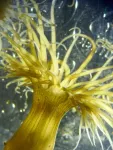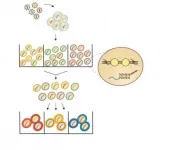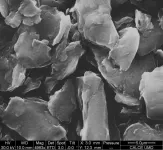How diet controls RNA maturation
Two UNIGE teams have discovered a new mechanism for regulating RNA maturation that depends on diet
2021-04-29
(Press-News.org) Particularly sensitive to chemical modifications, messenger RNAs (mRNAs) are molecules responsible for transmitting the information encoded in our genome, allowing for the synthesis of proteins, which are necessary for the functioning of our cells. Two teams from the University of Geneva (UNIGE), Switzerland, in collaboration with the Norwegian University of Science and Technology (NTNU), have focused on a specific type of chemical modification - called methylation - of mRNA molecules in the small worm Caenorhabditis elegans. They found that methylation on a particular sequence of an mRNA leads to its degradation and that this control mechanism depends on the worm's diet. These findings are to be read in the journal Cell.
Several steps take place before a DNA-encoded gene produces the corresponding protein. One of the two strands of DNA is first transcribed into RNA, which then undergoes several processes, including splicing, before being translated into a protein. This process removes unnecessary non-coding sequences (introns) from the gene, leaving only the protein-coding sequences (exons). This mature form of RNA is called messenger RNA (mRNA).
A "post-it" to block protein synthesis
In addition to these processes, RNA - but also DNA molecules - can undergo a chemical modification: methylation. This consists in adding a methyl group (CH3) which allows to modify the fate of these molecules without altering their sequence. Deposited on the RNA or DNA in very specific places like "post-its", methyl groups indicate to the cell that a particular fate must be given to these molecules. Methylation of RNA is essential: mice without RNA methylation die at an early embryonic stage.
Two neighboring teams at the UNIGE, one working on RNA regulation and the other specializing in DNA organisation in the worm C. elegans, have studied the role of methylation in controlling gene expression. The laboratories of Ramesh Pillai and Florian Steiner, professors in the Department of Molecular Biology at the UNIGE Faculty of Science, have shown for the first time that methylation at the end of the intron of a particular gene blocks the splicing machinery. The intron cannot be removed and the protein is not produced.
Fine regulation to ensure a fair balance
This gene, whose mRNA is modified by methylation, encodes for the enzyme that produces the methyl donor. "It is therefore a self-regulating mechanism since the gene involved in producing a key factor required for methylation is itself regulated by methylation!", explains Mateusz Mendel, a researcher in the Department of Molecular Biology at the UNIGE Faculty of Science, and the first author of this study.
Moreover, this modification is dependent on the quantity of nutrients received by the worms. "When nutrients are abundant, the mRNA is methylated, gene splicing is blocked, and the level of methyl donors decreases, which limits the number of possible methylation reactions. On the other hand, when there are few nutrients, there is no methylation of the particular RNA of this gene, so splicing is not blocked and the synthesis of methyl donors increases", reports Kamila Delaney, a researcher in the Department of Molecular Biology at the UNIGE Faculty of Science. Elements present in the food provide the raw materials required for producing the methyl donor, so methylation-dependent splicing inhibition puts a brake on its production under conditions of a rich diet. "Aberrant methylation reactions - too much or too little - are the cause of many diseases. The cell has set up this very sophisticated regulatory system to ensure a fair balance of methylations in the cell", summarizes Mateusz Mendel.
Methylation of mRNAs at these specific sequences was discovered in the 1970s by scientists, including Ueli Schibler, a former professor at the UNIGE, before being forgotten. It took 40 years before researchers rediscovered its importance in gene regulation in 2012. With this study, scientists from the Department of Molecular Biology highlight the crucial role of methylation in the control of splicing and in the response to environmental changes.
INFORMATION:
ELSE PRESS RELEASES FROM THIS DATE:
2021-04-29
A survey of over 32,000 caregivers of youth in Chicago Public Schools found that around a quarter of children and adolescents were described as stressed, anxious, angry or agitated after pandemic-related school closures and the switch to remote learning. Around a third of youth were described by caregivers as lonely and only one-third were described as having positive social and peer relationships. Across the board, caregivers reported significantly worse psychological well-being after school closures as compared to before. Findings were published in the journal JAMA Network Open.
"Caregivers are reporting that the pandemic and school closures have taken a substantial emotional toll on their children and adolescents," ...
2021-04-29
URBANA, Ill. - With threats of water scarcity complicating the need to feed a growing global population, it is more important than ever to get crop irrigation right. Overwatering can deplete local water supplies and lead to polluted runoff, while underwatering can lead to sub-optimal crop performance. Yet few farmers use science-based tools to help them decide when and how much to water their crops.
A new University of Illinois led study identifies obstacles and solutions to improve performance and adoption of irrigation decision support tools at the field scale.
"We wanted to offer our perspective on how to achieve field-scale precision irrigation with the most recent and advanced technologies on data collection, plant water stress, modeling, ...
2021-04-29
Researchers at Karolinska Institutet and the Public Health Agency of Sweden have studied newborn babies whose mothers tested positive for SARS-CoV-2 during pregnancy or childbirth. The results show that although babies born of test-positive mothers are more likely to be born early, extremely few were infected with COVID-19. The study, which is published in the esteemed journal JAMA, supports the Swedish recommendation not to separate mother and baby after delivery.
The population-based study comprised 92 per cent of all neonates - almost 90,000 births - in Sweden during the first year of the pandemic (11 March 2020 to 31 January 2021), making it one of the largest datasets in the field to date.
The results show a slightly higher level of morbidity ...
2021-04-29
During the first wave of the corona pandemic, 36 per cent fewer men were diagnosed with prostate cancer in Sweden than in previous years. On the other hand, the number of patients receiving curative treatment for prostate cancer was unaffected. This is shown by a new register study led by Uppsala University researchers, whose results are published in the Scandinavian Journal of Urology.
"We think the number of cases diagnosed fell because, early on, the Public Health Agency of Sweden urged older people to minimise their social contacts and, by the same token, refrain from non-urgent ...
2021-04-29
Microalgae of the dinoflagellate group are known for their ability to survive in other animal cells. These tiny single-cell organisms have engaged in mutually beneficial relationships with corals since primeval times. By passing on critical nutrients to their hosts, dinoflagellates allow corals to thrive even in barren areas. A research team from the Centre for Organismal Studies (COS) of Heidelberg University recently discovered that such symbioses within the cell essentially depend on the ability of the algae to suppress the immune system of their host cell and thereby avoid being "spit ...
2021-04-29
Nearly half of adults in the United States have hypertension, a condition that raises the risk for heart disease and stroke, which are leading causes of death in the U. S.
At Baylor College of Medicine, Dr. David J. Durgan and his colleagues are dedicated to better understand hypertension, in particular the emerging evidence suggesting that disruption of the gut microbiota, known as gut dysbiosis, can have adverse effects on blood pressure.
"Previous studies from our lab have shown that the composition of the gut microbiota in animal models of hypertension, such as the SHRSP (spontaneously hypertensive stroke-prone ...
2021-04-29
The outbreak of COVID-19 has revealed the widespread effects a pandemic can have on all spheres of life from health, to social life, to the economy. The main thrust of efforts to control the spread has been to decrease the reproduction rate to flatten the curve of the total number of infected individuals per day in order to reduce overload on the health system. The most widely implemented response to the exponential growth of the infection has been widespread quarantine and lockdown. While isolation is an effective tool to decelerate the spread, repeatedly imposing complete ...
2021-04-29
Small and medium-sized manufacturing enterprises (SMEs) face many obstacles and difficulties (economic, technical, cultural, etc.) when it comes to implementing Industry 4.0. "These are transition processes that are economically costly, and in which SMEs often come up against technical and cultural problems, as they are not cognizant of how to make this transition, or of the benefits their companies stand to gain by implementing Industry 4.0," explained the UPV/EHU pre-doctoral researcher Víctor Ramírez-Durán.
While several pieces of work address the incorporating ...
2021-04-29
NEW YORK, NY (April 29, 2021) - In a new resource for the scientific community, published today in Nature Biotechnology, researchers in the lab of Neville Sanjana, PhD, at the New York Genome Center (NYGC) and New York University (NYU) developed CRISPR-sciATAC, a novel integrative genetic screening platform that jointly captures CRISPR gene perturbations and single-cell chromatin accessibility genome-wide. With this technology, they profile changes in genome organization and create a large-scale atlas of how loss of individual chromatin-altering enzymes impacts the human genome. The new method harnesses the programmability of the gene editing system CRISPR to knock-out ...
2021-04-29
Exploring extreme environments can put significant operational challenges on the engineering systems we depend upon to safely explore and at times operate within.
Within high-value and safety-critical applications, such as space exploration or sub-surface drilling, the extreme and at times dynamic operating conditions within the environment, can make it challenging to understand the life expectancy of critical components and sub-systems. Hence, it's a highly complex and at times impossible situation to accurate understand therefore predict.
To have safe, resilient and economically viable operations within these challenge environments, it is vital ...
LAST 30 PRESS RELEASES:
[Press-News.org] How diet controls RNA maturation
Two UNIGE teams have discovered a new mechanism for regulating RNA maturation that depends on diet





